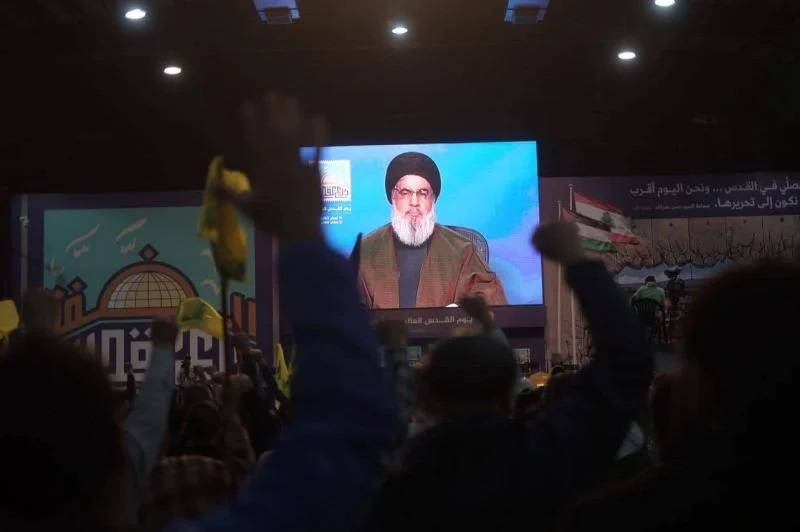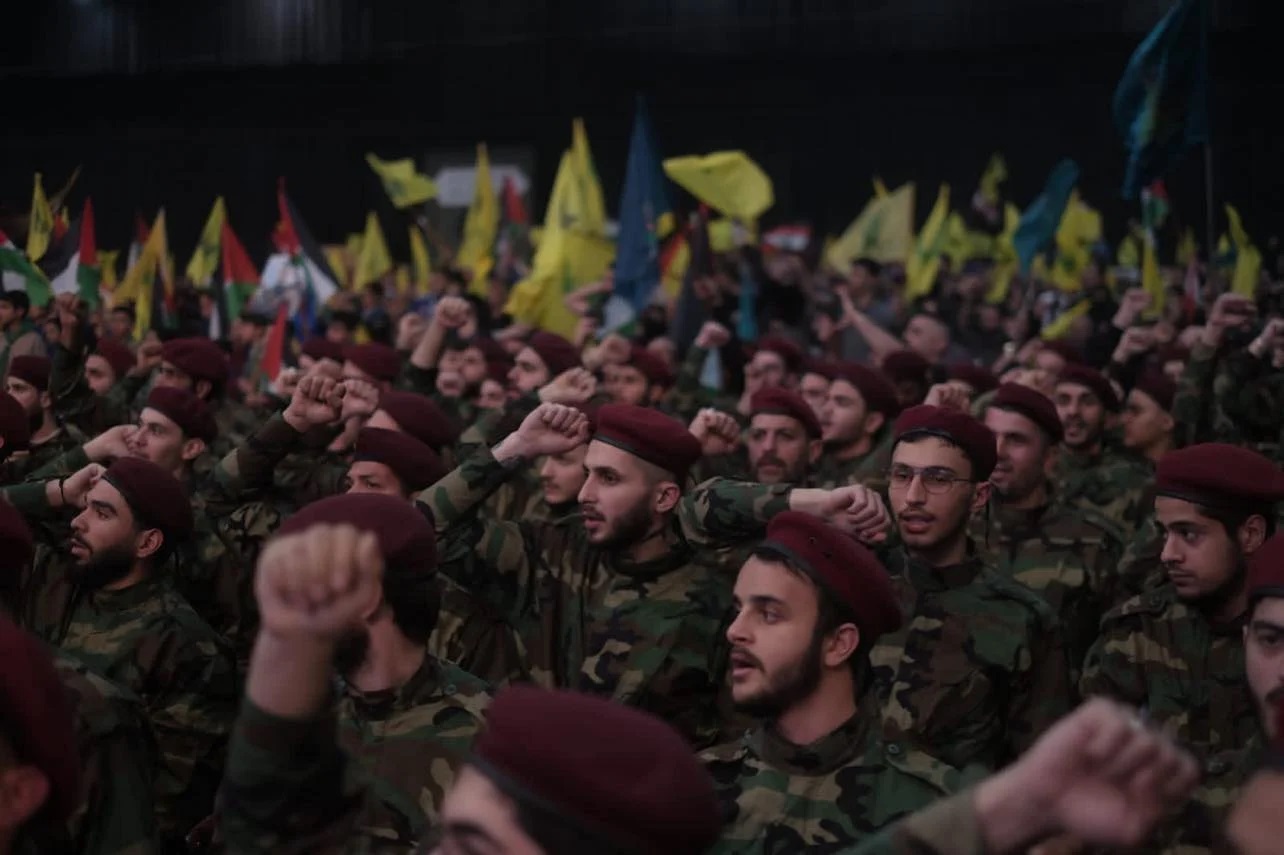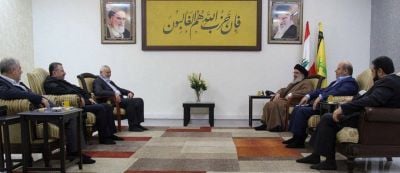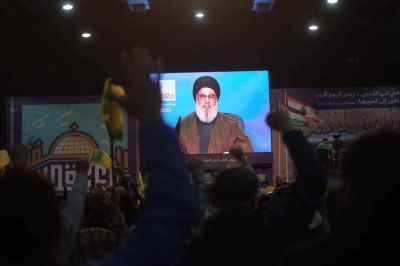
Hezbollah leader's speech replayed on April 14, 2023, in the southern suburbs of Beirut, on the occasion of the World al-Quds Day. (Credit: João Sousa/L'Orient-Le Jour)
BEIRUT — A week after Israel launched retaliatory strikes on South Lebanon following a barrage of rockets fired across Lebanon's southern border, Hezbollah's secretary-general, Hassan Nasrallah, warned Friday of "a major war" in the region, because of the "reckless actions" of Israeli Prime Minister Benjamin Netanyahu "in Jerusalem, the West Bank, Gaza, Lebanon and Syria."
Nasrallah, who described this outburst of tension as "an important and significant event," said that a "policy of silence" regarding these events was "best."
Nasrallah refrained in his last speech, on April 7, from commenting on the sudden flareup between Lebanon and Israel.
He also accused on Friday the Israeli prime minister of spreading "lies," denying that "Hezbollah or Hamas infrastructure" had been hit by the Israeli army's strikes in South Lebanon.
Hezbollah's leader made his remarks in a speech on the occasion of the Al-Quds Day (Jerusalem Day), decreed by Ayatollah Ruhollah Khomeini, leader of the Islamic Republic of Iran from 1979 until his death in 1989, and celebrated every year on the last Friday of Ramadan, the Muslim fasting month, in solidarity with the Palestinians.
 Hezbollah activists, on April 14, 2023 in the southern suburbs of Beirut, during a live broadcast of a speech by party leader Hassan Nasrallah. (Credit: João Sousa/L'Orient-Le Jour)
Hezbollah activists, on April 14, 2023 in the southern suburbs of Beirut, during a live broadcast of a speech by party leader Hassan Nasrallah. (Credit: João Sousa/L'Orient-Le Jour)
On April 6, dozens of rockets were fired from Lebanon into Israeli territory. These rocket attacks came a day after Israeli police violently stormed the Al-Aqsa mosque — Islam's third holiest site — in Jerusalem to dislodge Palestinians who had barricaded themselves inside.
Israel responded to the rocket attacks at dawn on April 7 by striking South Lebanon. Israel also launched attacks on the Gaza Strip the same morning, also in response to rocket fire from the blockaded Palestinian enclave.
Israel has blamed the Palestinian Islamist movement Hamas for the incident on the Lebanese border, although to date no group has claimed responsibility for the rocket fire. Hamas's political bureau chief, Ismail Haniyeh, was in Beirut at the time.
On April 10, Israeli Prime Minister Benjamin Netanyahu assured that he would not "allow the terrorist Hamas to establish itself in Lebanon" and promised to "restore security" in his country by acting "on all fronts."
Many observers believe that rocket launches from Lebanon could not have taken place without Hezbollah's endorsement. The Shiite group is omnipresent in South Lebanon, and its leaders have recently advocated "unity of fronts" in their speeches.
On April 9, Hezbollah issued a statement saying that Nasrallah and Haniyeh had discussed the "state of readiness of the axis of resistance" against Israel.
Gebran Bassil, head of the Free Patriotic Movement and Christian ally of Hezbollah, criticized this "unity of fronts" in a speech on April 13.
Warnings against a war
Speaking via video link to a crowd of supporters and activists gathered in the southern suburbs of Beirut, the Hezbollah leader said in his speech that "Israeli Prime Minister Benjamin Netanyahu is too cowardly to wage a war against Iran."
"But we must warn the enemy: Some of your reckless actions in Jerusalem, the West Bank, Gaza, Lebanon or Syria may lead the region to a major war," Nasrallah said. According to the Hezbollah leader, "at the moment, neither Lebanon nor Syria nor Gaza want war … but the enemy's actions and crimes could lead the region to a conflagration."
The Hezbollah leader's warnings did not end there. "To the Israelis and the Americans, we say: Beware, the sacred elements for Muslims and Christians are a red line; Hebron is a red line; the Palestinian population is a red line."
"From Beirut and its southern suburbs, we say that we are committed to the Palestinian people, and we will not let Palestine down," Nasrallah added.
Infrastructure intact
The Shiite leader also justified once again his abstention from commenting on the incidents at the border. "The policy of silence that Hezbollah and the Resistance adopt is the best in the war against the enemy. So there is no need to go into details. The policy of silence worries the enemy, but perhaps also the friends. But the concern of friends can be dealt with," he said.
For him, "the enemy must remain worried and afraid. No one should give him assurances, because he is the aggressor who attacks the Palestinian people every day, bombs Syria almost daily and threatens the Lebanese."
Nasrallah also accused Netanyahu of "telling lies" about the Israeli strikes in southern Lebanon. "The biggest lie is when he said that Israel bombed Hezbollah and Hamas infrastructure. All the media went to the site of the strikes; it turned out that they were banana fields and irrigation. No infrastructure of Hezbollah or Hamas was hit," Nasrallah said.
Nasrallah then reacted to the threats that the Israeli prime minister recently made against him. "I was told that Netanyahu threatened me by name, promising that 'we will see what we will see.'"
"We too, as the Resistance in Lebanon, tell him: 'You will see what you will see,'" the party leader said. "The enemy must know that threats against Lebanon and the Resistance are useless. They make us stronger and determined to protect Lebanon and all those who may target it."
"We will retaliate to any action targeting anyone in Lebanon in the right way and with intensity, without any hesitation," the Hezbollah leader warned.
Iran, Saudi Arabia, Syria
Nasrallah also commented on regional issues, including the restoration of diplomatic relations between Saudi Arabia and Iran.
"The Iranian-Saudi agreement has started to have consequences faster than some people thought, and we hope that it will affect Lebanon," he said, adding that he believes it will have a "positive" impact and "slow down the normalization" with Israel.
"What they called the 'Sunni axis' has fallen. The bet on a war led by the Gulf countries against Iran has fallen," he said.
Nasrallah also commented on Arab efforts to normalize relations with the regime of Syrian President Bashar al-Assad, the day after a meeting between the Saudi and Syrian foreign ministers for this purpose. "The important thing is the return of normal political relations between Syria and the Arab countries. This is what matters," he said.
The Lebanese Foreign Ministry on Friday welcomed "Arab efforts to find an Arab solution to the Syrian crisis."
Riyadh and Tehran severed diplomatic relations in 2016 after protesters in Iran attacked Saudi diplomatic missions following Saudi Arabia's execution of a prominent Shiite cleric. But the two capitals signed a normalization agreement on March 10 under the auspices of China, announcing the restoration of their relations and the reopening of their respective embassies. Many expect this agreement to have a positive impact on the Near and Middle East, where Iran and Saudi Arabia are competing for influence.
Hezbollah's secretary-general did not mention in his speech local political issues, including the presidential election, as Lebanon continues to face a dual power vacuum in its executive since the end of Michel Aoun's presidential mandate in October 2022.

